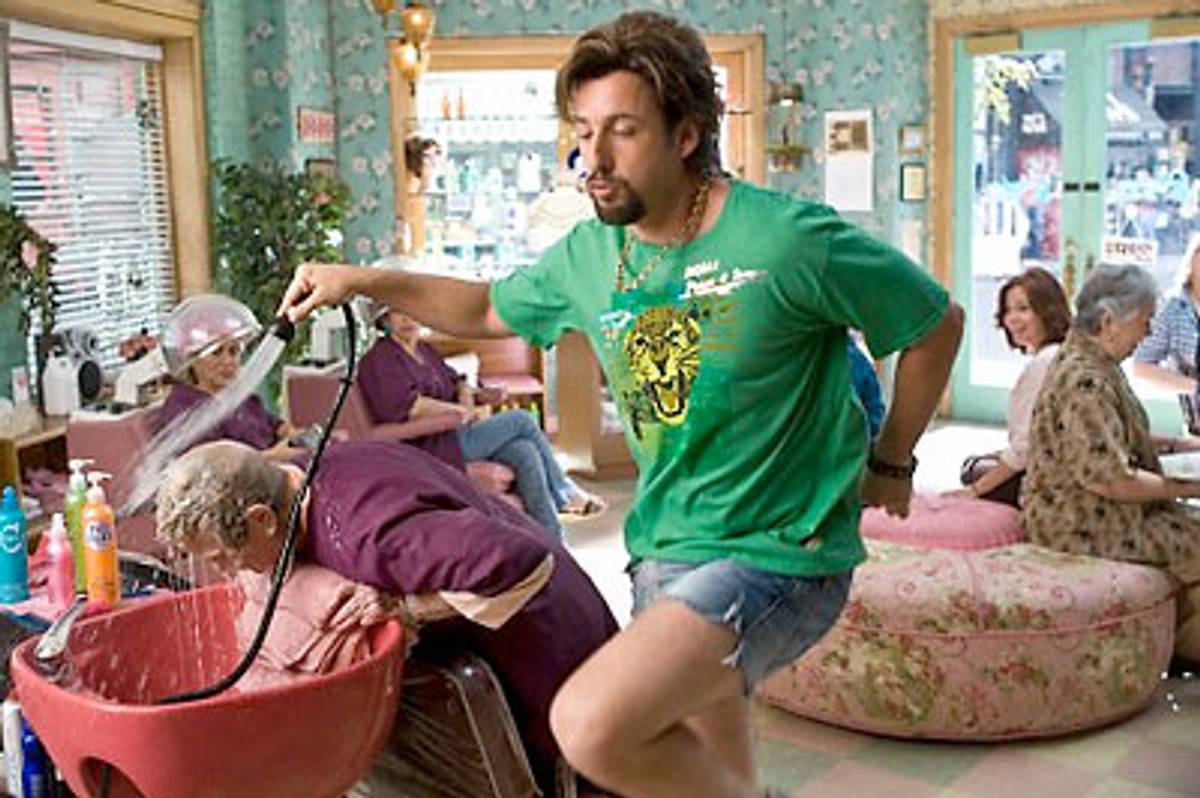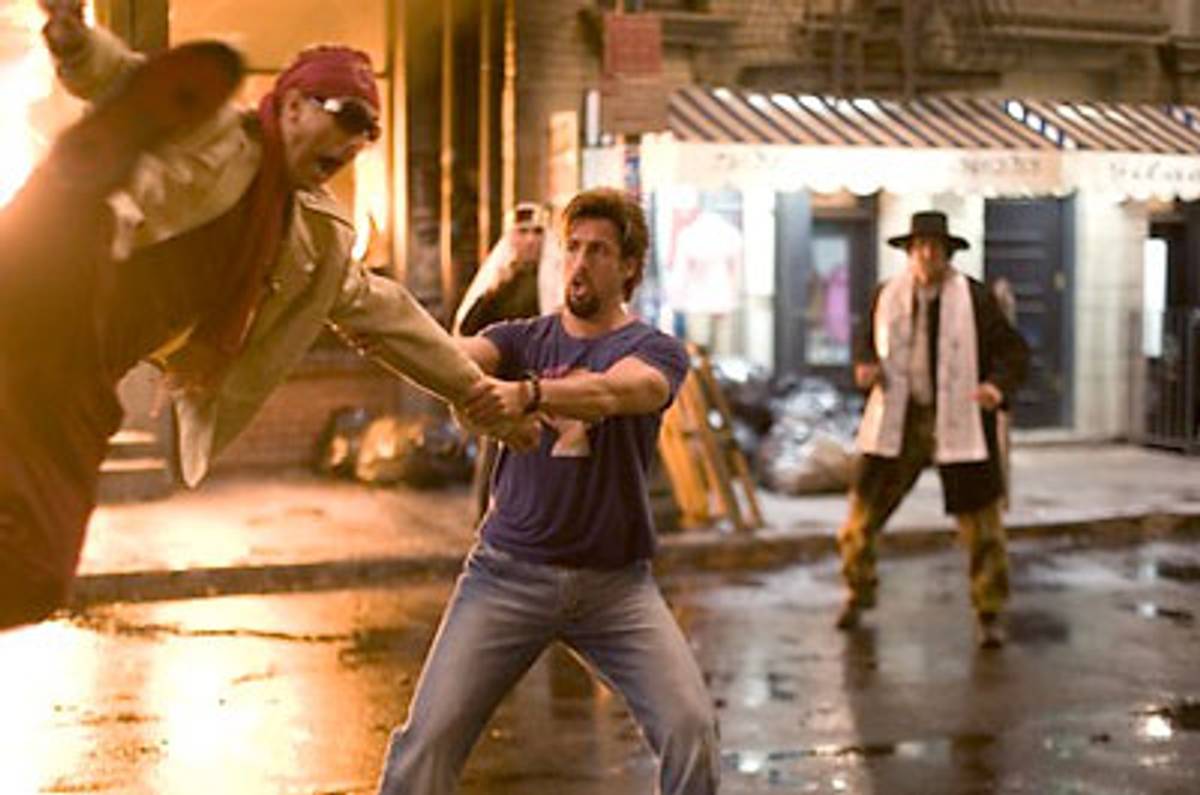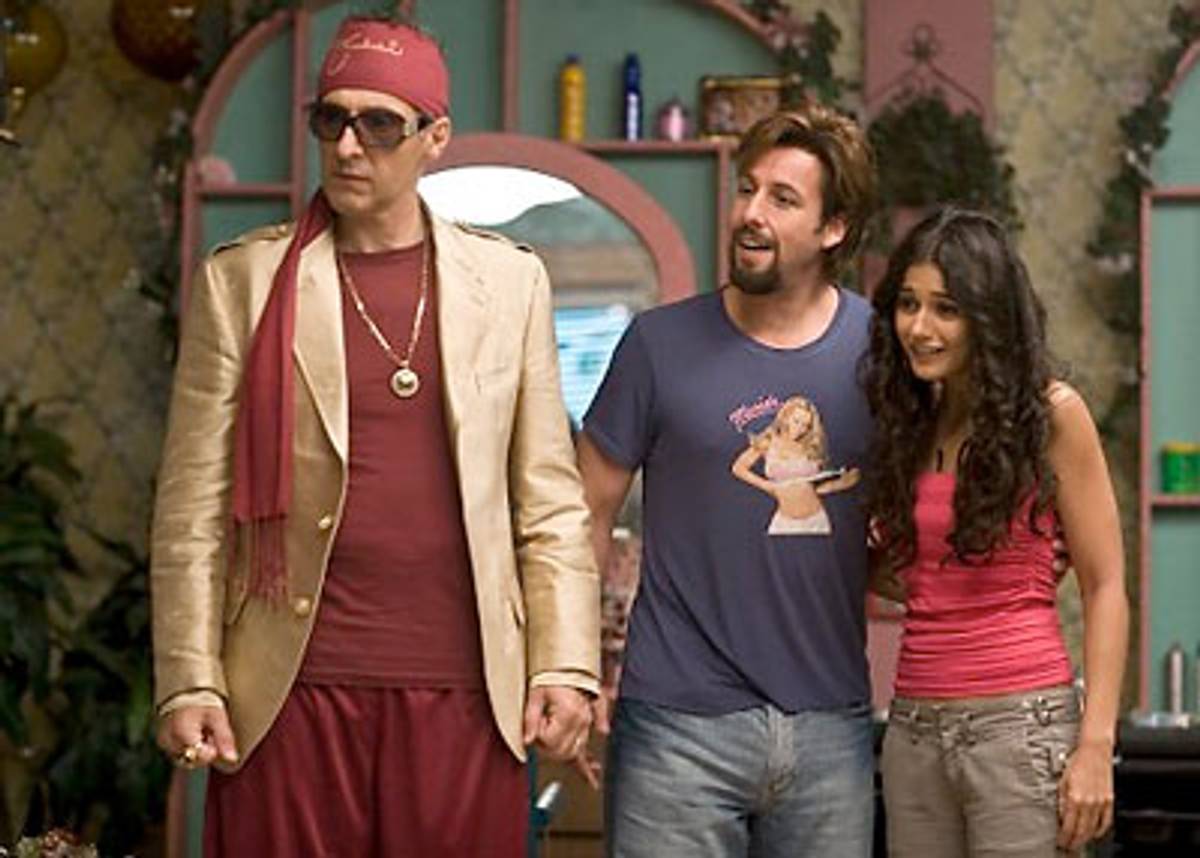Not so long ago, when I was a student at Tel Aviv University’s film school, I mastered the delicate art of writing a particular kind of term paper. Under a title like “Invisible Faces” or “Unheard Voices,” the paper would assert that Hollywood, arbiter of all things cultural, relegated anyone who wasn’t white or male or straight to some representational purgatory where they were perpetually portrayed in a skewed, stereotypical manner for the amusement of the dominant elites. It was the sort of paper I loved writing: it came with its own readymade terminology—Hegemony! Otherness! Discourse!—as well as its own readymade readership, thin and anxious doctoral students who generously graded anyone willing to argue that somehow, somewhere, Hollywood was doing someone some sort of injustice.
I was reminded of those days shortly after seeing Adam Sandler’s new movie, You Don’t Mess With the Zohan. As I stumbled out of the cinema, I couldn’t help thinking that for all the attention I paid to Hollywood’s misrepresentations of just about every minority imaginable, one group never crossed my mind: my own people, Israelis.
Israeli protagonists in American film, I realize now, belong to two basic groups. The first—Paul Newman’s Ari Ben Canaan, say, or Kirk Douglas’s Mickey Marcus—consists of strong and silent men whose chiseled shoulders carried beautiful blondes, large guns, and the entire weight of Jewish history. The second—think of Richard Dreyfuss as a somber commando in Victory at Entebbe or of Avner, Eric Bana’s character in Munich—consists of men who differ from their brethren in that they seem to prefer brunettes and follow up the killing with a debilitating shot of self-doubt, guilt, and shame.

Amazingly, Adam Sandler has just forced on Hollywood an entirely new category of Israeli hero, and in doing so he and his co-screenwriters, Robert Smigel and Judd Apatow, along with director Dennis Dugan, may just have created the first film that strips the Israeli-Palestinian conflict of its distorting filters and instead presents the century-old battle in all its raw absurdity.
In case a twelve-year-old hasn’t described the plot to you yet, Zohan Dvir, portrayed by Sandler with a tragic haircut and a strange, throaty accent, is Israel’s number one spy, a sexually omnipotent supersoldier who can catch bullets in his nostrils. Tired of the endless cycle of violence, and moved by a lifelong dream to become a famous hair stylist, he fakes his own death, moves to New York City, finds work in a beauty salon owned by a Palestinian woman, falls in love with her, and learns to transcend his own prejudices and hatreds.
It sounds like a simple, even simplistic, story. And it is. That’s the whole point.
Unlike his Hollywood ancestors, Zohan is virtually incapable of reflection. The only history he is truly concerned about has nothing to do with Zionism and the fate of the Jews; rather, he worships Paul Mitchell, the legendary hair guru whose outdated 1980s stylings Zohan still perceives as the height of fashion. When he sends a Palestinian terrorist flying off a balcony, or blows up a building in Beirut, he does so because he likes it and because he is good at it. In Zohan’s world, these are the only two reasons a man could ever need for doing anything.

The other thing Zohan both excels at and enjoys is sex. After struggling to make an impression as a stylist, he finally succeeds when he turns the traditional cut-and-color into an orgiastic free-for-all that begins with suggestively shooting shampoo from his pelvis and ends with a quick romp with his clients in the salon’s back room. That the clients are mostly women of a certain age matters not at all to Zohan; to him, women are women and sex is sex and anything else—like age, for example, or looks, or propriety—would simply complicate things.
Here lies Zohan’s true brilliance. He realizes instinctively that waging war and making love are two frighteningly similar acts—the French had it just right when they mused about la petite mort—and that both are so thrilling precisely because they allow the body the rare privilege of escaping the nervous and contemplative tyranny of the mind. In combat and in copulation alike we do whatever comes naturally, guided by muscle memory, never for one second succumbing to analysis or thought of consequence.
In a sense, then, it wouldn’t be too much of a stretch to argue that killing and fucking are among the very few things that are truly universal, that strip us of the constructs of culture and religion and nationality and unite us in primordial grunts of rage or passion. Killing and fucking, in other words, may tear us apart, but they may also bring us together.

That is certainly the case with Zohan. After spending much of the movie scuffling with the Phantom—a Palestinian archterrorist played by a delightfully hammy John Turturro—he finally realizes that he and his nemesis are more alike than they’d thought. As can be expected from a summertime comedy starring Adam Sandler, this realization arrives in the form of a third-act bonding, with both men hugging out their differences and committing themselves to peace, love, and Mariah Carey. But what truly brings them together is something darker and more complex: as they go about trying to kill each other and/or bed throngs of women, Zohan and the Phantom slowly come to understand that the hypermacho ideology on which they were both reared—the ideology that determined their fates, that places so much store in sex and death and the body—has infected their societies, oppressed their people, and turned their respective homelands into a wilderness of death and desire.
This, I think, is what Zohan really means when, stowed away in the cargo area of a transatlantic flight, he lectures two woolly dogs on the Israeli-Palestinian cycle of violence: Coco barks at Scrappy, he explains (using a metaphor he hopes the dogs will relate to), and Scrappy bites Coco, and both run around in circles and shove their noses into each other’s privates. The problem with this scenario, Zohan soon realizes, isn’t so much its pointlessness—after all, he himself takes great pleasure in shoving his nose into other people’s private parts—as its mindlessness. Like Coco and Scrappy, Zohan recognizes, Israelis and Palestinians are incapable of stepping back and thinking about their actions, and therefore have little chance for change.
It is precisely this thoughtlessness that delivers the movie’s funniest moments. One after another, we are presented with a gallery of hilarious characters: the Israeli swindler who swears an overpriced gadget is really a Sony product only mildly refurbished; the would-be Palestinian terrorist who is more enraged with the Mets for signing a generous deal with the aging and ineffective slugger Carlos Delgado than he is with Israel for bombing his native village. These characters are only slightly exaggerated versions of the real-life strivers who man moving companies and electronics stores and taxi cabs all over New York. But it’s this approximate realism that shapes them into small-scale tragic figures: We laugh at their bravado and their accents, but we also realize that they are who they are because entire societies exist to make sure they turn out that way, societies that need and value soldiers above all, societies that long ago gave the body free reign over the mind.
The film’s real achievement lies in demonstrating that if we ever want to make sense of these societies, not to mention change them, we had better begin to look at them not through the usual lens—contemplative, elegiac films saturated with ideology—but rather as they really are, rollicking and robust and deeply impulsive.
Of course, I could point out the irony in a stereotype-bashing movie that relies on indelicate depictions of gun-loving rednecks and lascivious old gay men as comic foils. But I’ll leave that to the undergrads.
Liel Leibovitz is editor-at-large for Tablet Magazine and a host of its weekly culture podcast Unorthodox and daily Talmud podcast Take One. He is the editor of Zionism: The Tablet Guide.